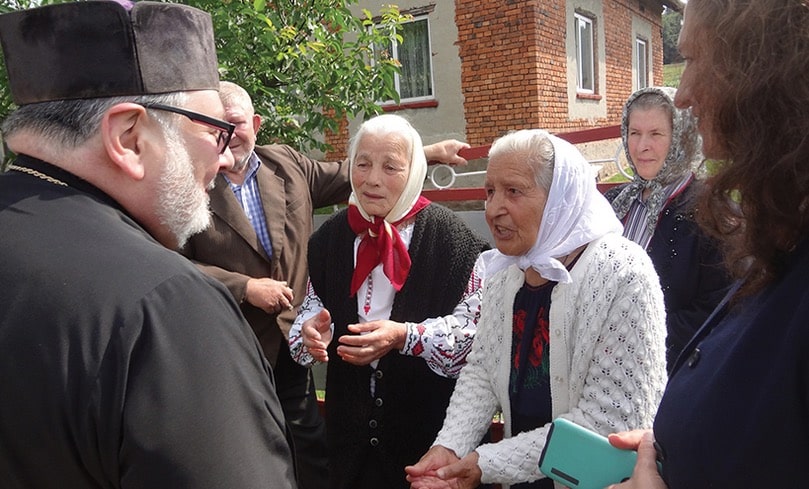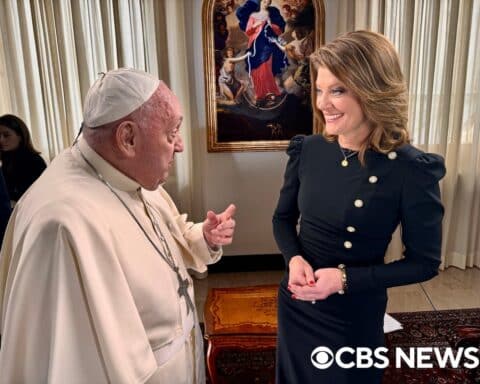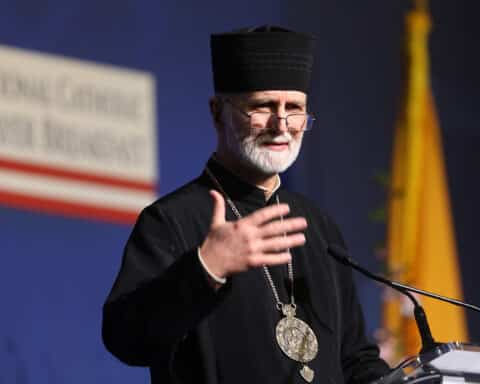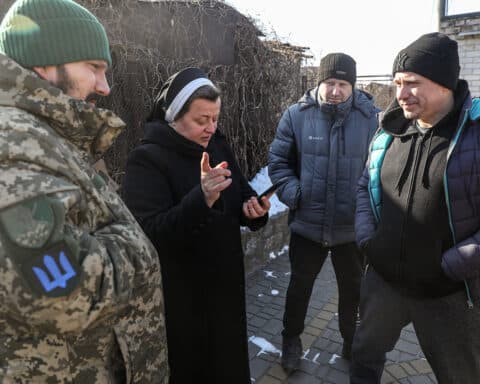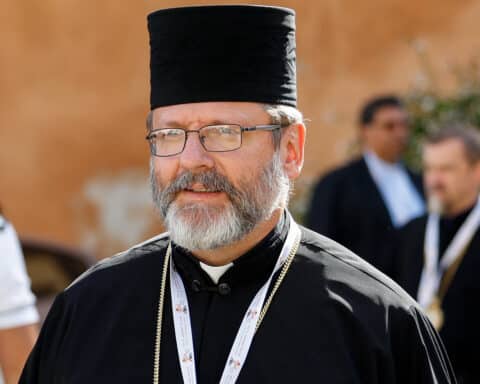What would happen if one’s church were declared illegal by the state? This is not a thought exercise for Ukrainian Catholics. The total oppression and liquidation of their Church under Soviet rule is a reality that still looms large in their identity. Like the rings in a tree trunk that show when a great fire or drought occurred, the underground period of the Ukrainian Greek Catholic Church is one of those markers that you find in the history of every adherent over a certain age.
One of those adherents has also been, since 2011, the head of the Ukrainian Greek Catholic Church, Archbishop Sviatoslav Shevchuk. Now 48, he recalls listening to divine liturgy broadcast over a pirated Vatican Radio signal, never dreaming that he would one day celebrate that liturgy publicly. Archbishop Shevchuk refers to the 1946-89 period following the underground as the “resurrection period” of the Ukrainian Greek Catholic Church, a term that carries the weighty implication that, for over 40 years, their Church was at least officially dead, or existed only in the diaspora outside its homeland.
Total liquidation
In 1946, all Ukrainian Greek Catholic bishops were either imprisoned or executed by Soviet authorities. Catholic properties were confiscated and then used by the government or handed over to the Orthodox. Some priests, under government coercion, signed an agreement and became Orthodox, so that they and their families were not exiled to Siberia or hauled into court as “spies of the Vatican.” But Archbishop Volodymyr Viytyshyn, today the head of the Ukrainian Greek Catholic Archeparchy of Ivano-Frankivsk, noted to Our Sunday Visitor, “Not a single bishop folded.”
This wave of oppression occurred across much of Eastern Europe in the wake of World War II.
“In most of the countries, there was actually a rather vibrant civic life before Communism took over, and in most places the communist system just destroyed it,” Tetiana Stawnychy, director of the U.S. Conference of Catholic Bishops Collection for the Church in Central and Eastern Europe, told OSV. This process, she said, included “really ripping out of faith from society” in seeking either to completely oppress the Church or at least to control it.
Many Catholics were reluctant to attend Orthodox churches because it would be reported to the government, leading to persecution. After Stalin died, political prisoners were released, and some Ukrainian Greek Catholic priests returned to their families and parish communities but continued their ministry underground.
“They were like the first Christians,” numerous people told OSV.
Hidden vocations
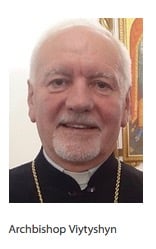
“In school they were saying, ‘There is no God; you don’t need to pray,’ and my mother was telling me, ‘Pray!'” he recalled.
“Young people want to be heroes,” he said of his decision to become involved with his faith in this context. “I learned to be a cantor and traveled with the bishop, helping with the liturgy, carrying his case.” The bishop proposed that he might want to study to become a priest. He was ordained in 1982.
Of course the path to ordination was anything but conventional during this time. The home of the late Father Mykhaylo Kosylo served as an underground seminary beginning in the late 1960s. Of the 100 or so young men who entered, about 20 would become priests in the underground. The format was individualized guided study for each seminarian. This was necessary in order to keep young men in the dark about the identities of their fellow students, should any of them ever be brought in for questioning by the authorities or the KGB seek to infiltrate them.
“To learn how to sing, we had to go into the Carpathian Mountains” so no one could hear,” Archbishop Viytyshyn said.
“The students didn’t even take notes,” lest there be a paper trail, Father Viktor Pryjdun told OSV.
Father Pryjdun helps preserve Father Kosylo’s house in the village of Dora in the Carpathian Mountains, which stands today as a small museum and testament to his efforts to help keep his Church alive, complete with secret nooks to hidden forbidden books.
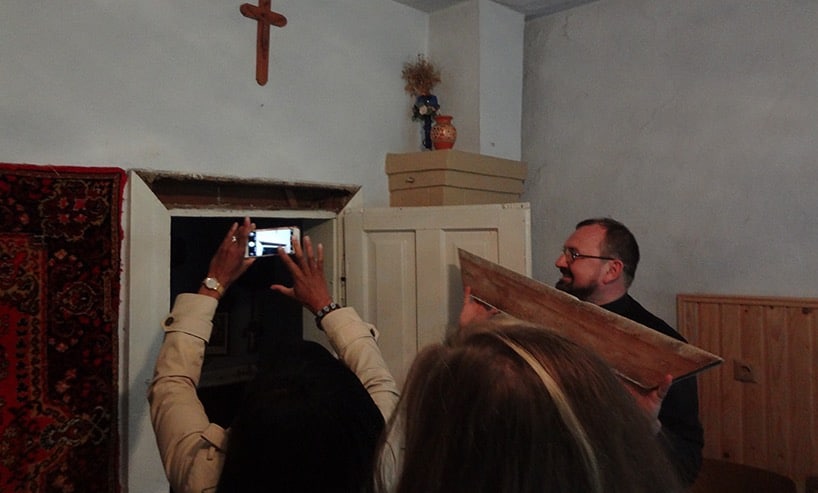
Clandestine community
“In becoming a priest, you were agreeing to be a martyr,” Archbishop Vasyl Semeniuk of the Archeparchy Ternopil-Zboriv told OSV. He recounted the experience of being interrogated by KGB for days on end.
Archbishop Semeniuk, who is now 69 years old and was ordained a priest in 1974, celebrated clandestine liturgies in the dead of night in villages, on one occasion having to be spirited out incognito by the villagers when the KGB arrived.
“Their homes became like our churches,” Archbishop Viytyshyn told OSV. Liturgies, baptisms and confessions all occurred in a setting he likened to the Acts of the Apostles.
Ovysia Melkytyn, whose mother’s home in the village of Zarvanytsia served as one of these settings, recalled, “We would shut the blinds, because we were always very worried that they not catch the priest and that they take him away from us.”
Underground priests held day jobs because everyone was required to work in the Soviet system.
“I had to find a job in the Soviet Union that wouldn’t disturb my priestly ministry. And so our people, the underground faithful, helped me find work working for the fire brigade. You had to work one day, full day, and then three days you were off,” Archbishop Viytyshyn said.
He added that the agreement among the priests was never to give the KGB the name of their consecrator. If asked, priests would pick the name of an older priest who had already died and say, “He ordained me.” When the KGB would protest that the priest they named was not a bishop, they retorted, “How do you know?”
Bishop Josyf Milian, M.S.U., auxiliary bishop of Kiev-Halyc, who was ordained an underground priest in 1984, shared with OSV that his own family didn’t even know he was a priest for years following his ordination.
This chapter of its history colors the Ukrainian Greek Catholic Church even today, and not just as a painful memory. Stawnychy of USCCB observed, “Because it was forced underground and then emerged after Communism fell, that there’s something very vibrant and genuine about its witness.”
“One of the missions of the underground priests was to encourage these people and to tell them that … yes, we’re suffering, but we’re doing this for Christ,” Archbishop Viytyshyn said. “That’s why the Church survived; people were humans, in all the best sense of the word.”

